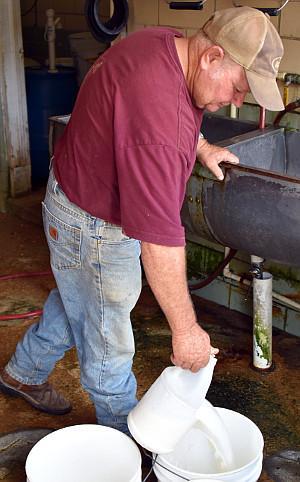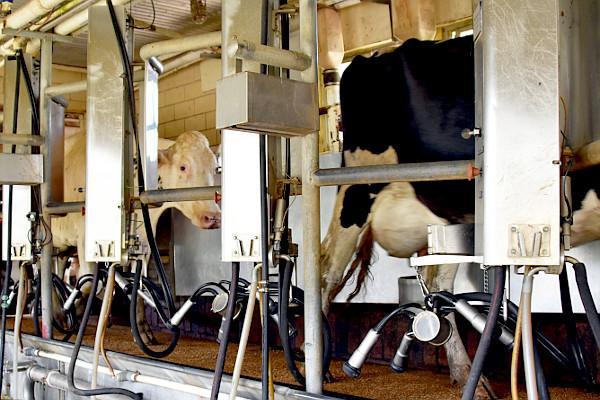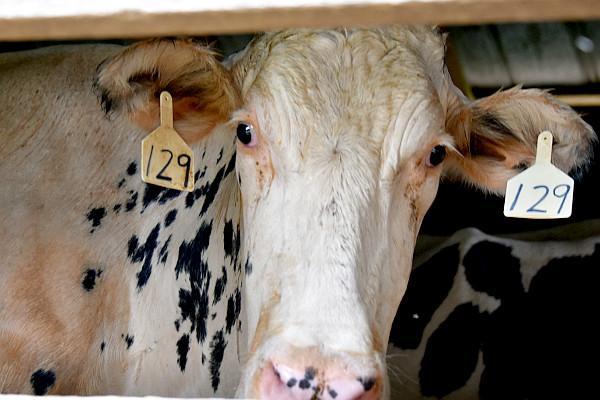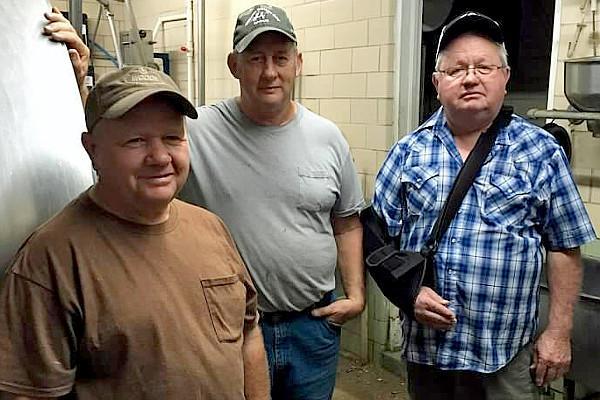
Photo by Jessica HughesJimmy Thompson performs one of many tasks at the family business.

Photos by Jessica HughesCows were milked twice a day. “It was never long until the next milking,” Jimmy Thompson said.


Photo by Janice WaggFrom left are Jimmy Thompson, Tommy Thompson and Morris Thompson.
End of an era
“Well, that’s it,” said Morris Thompson as he turned off the lights and quietly closed the door.
On August 31, an amazing legacy came to an end when the Thompson family closed their family dairy located in Watson.
There is a sense of loss not only for the family (and their pets) but for the whole community. The men no longer rise at 2 a.m. to be in the barn by 3 a.m. though they are having trouble learning to sleep in. The cats and Sadie Bell (their lab) wonder what has happened to their daily treat of a saucer of milk. The family says it helps having the cows they are raising present on the farm.
Returning from his duties as a bomber in WWII in May of 1946, Curtis Thompson found his brother James milking a few dairy cows by hand and selling Grade C milk to the cheese plant in Olive Branch with milk cans being set by the mailbox to be picked up. Curtis invested in a few cows of his own and together they bought a milking machine and opened a dairy and began selling Grade A milk to the Memphis, Tenn., plant.
A neighbor, Eugene Hanna, hauled his milk along with milk from other local dairies to Memphis. It was still shipped in cans cooled in a large cooler before being put in Hanna’s insulated truck to stay cool until it reached the facility. Along the way, a tank was purchased to hold the milk until a milk truck could transport it.
In 1961, the family built a new building with new modernized equipment and began using the old building for storage.
Curtis’s son, Tommy, and James’ sons, Morris and Jimmy, grew up on the farm and naturally became a part of the business.
Morris said, “I can’t remember a time when I didn’t work in the dairy cleaning stalls or putting feed in buckets according to how much each cow was to be given to eat.”
As soon as he could read and do math, that became his job. He would fill the buckets in the order the cows were being milked in the stalls and the workers would take the buckets to the right cow. Eventually a computer replaced his careful calculations.
Jimmy remembers filling water troughs at an early age, picking up sacks of feed (which he still does), and when finished, his job was to water the turnip greens.
Tommy’s earliest memories include feeding all the calves and getting up before school to manually clean out the barn. It was a great day when they began using a flush hose to clean the floors.
They all clearly remember getting up before school to milk the cows. None of them participated in extracurricular activities at school as there was no time. Morris was an active member of the FFA and all showed their prize cows through 4-H. None of them had jobs outside the dairy life.
Cows were milked twice a day with the first milking beginning at 3 a.m. and the next one at 3 p.m. – every day.
“It was never long until the next milking,” Jimmy said.
Between milkings, there were other farm chores to do, including growing and harvesting hay and silage for the cows.
Jimmy said, “Since I was 10 or 11 we filled the biggest silo with silage each year until none of us could climb to the top anymore. We did that for at least 50 years.”
Days off, holidays or vacations were rare. They also “chopped” and picked cotton. All the while, their fathers were telling them “how easy they had it” and of course they share that wisdom with grandsons Wyatt, McGee and Kevin.
Outside the dairy building you can find a set of stools where each generation has spent hours talking over the problems of the world, sharing wisdom with the younger generation or even taking short “power” naps.
As with any job, accidents were a part of the farm life; however, Morris seemed to attract the majority of those. A motor fell on his head from one of the silos in the early ’60s, but the one that he and the family remember the most happened in 2003 when Morris got caught in a shaft causing major damage to his arm. He recently endured yet another surgery from this accident.
Summer afternoons provided a short break for those who were hauling silage with home-grown watermelons that had been pulled and put under the shade tree earlier in the day. Wintertime usually brought new baby calves to be bottle- and bucket-fed until they were old enough to be weaned.
The dairy provided jobs for many workers over the years, some who stayed a short time and some who stayed many years. Not many wanted to commit to the early hours and hard work of the dairy life. They never had to hire a mechanic as the men handled all the repairs, provided most of the labor and delivery, and although they had a dependable veterinarian when needed, they were able to complete most of the animal care themselves. Their long-time veterinarian now uses a walker but makes “barn calls” if needed.
When asked why they decided to close the dairy, all were quiet for a time.
One then said, “It’s not like it used to be.”
There are fewer than 80 family dairies left in Mississippi. At one time there were 1,200. Costs have continued to climb while the price of milk has not, making it hard to make a living. They were offered an opportunity to raise heifers for another dairy and it seemed to be an easier job than what they were doing. Having the cows around makes the closing of the dairy a bit easier.
Morris’s wife Sandra said the history and legacy is amazing. Earnest Thompson (grandfather) drove a school bus, did veterinarian work and farmed. Nearly 100 years ago, he sold his land in DeSoto County to his sister and bought approximately 100 acres in Watson. The family now owns 1,200 acres.
The children, grandchildren, and great-grandchildren have had the opportunity to learn the value of a hard day’s work. They learned farm skills such as driving a tractor, taking care of animals, raising crops and responsibilities of life on the farm.
Some of the perks of owning a dairy meant always having fresh milk for homemade ice cream, snow cream and boiled custard at Christmas.
Being around God’s creations of livestock and crops and all seasons with family, with God’s guidance through it all, were the biggest blessings, they agreed.

